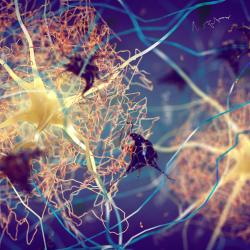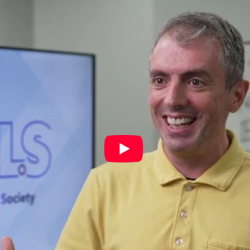Andrew Childs Named Interim Director of the University of Maryland Institute for Advanced Computer Studies
Computer Science Professor Andrew Childs was named interim director of the University of Maryland Institute for Advanced Computer Studies (UMIACS), effective July 1, 2025. Childs is the director of the NSF Quantum Leap Challenge Institute for Robust Quantum Simulation (RQS) and was a co-director of the Joint Center for Quantum Information and Computer Science (QuICS) from 2014 to 2024.

“Andrew is highly visible within the quantum information community and has a demonstrated reputation for building partnerships in research and education,” said Amitabh Varshney, dean of UMD’s College of Computer, Mathematical, and Natural Sciences (CMNS). “He is known to be a thoughtful, inclusive and responsible leader, and I am grateful he has agreed to serve as UMIACS director for the next year.”
Childs will lead the multidisciplinary institute that pioneers computational science advances in national defense, precision medicine, big data, cybersecurity, language and culture, and more. The institute consists of 78 faculty members, more than 200 graduate students from multiple departments across the UMD campus, and 30 administrative and technical staff members. UMIACS secures annual sponsored research funding exceeding $25 million.
“UMIACS plays a crucial role in fostering interdisciplinary computing research at Maryland,” Childs said. “I’m very grateful for its many contributions to the growth of QuICS and RQS, and I’m glad to be able to help keep it at the forefront of computational science while the college searches for a new director.”
A leading scientist in the field of quantum algorithms, Childs has helped develop both theoretical foundations and practical applications for quantum computers, which have the potential to address problems that are beyond the reach of traditional computational methods.
Several recent papers co-authored by Childs—including “Toward the First Quantum Simulation with Quantum Speedup,” published in Proceedings of the National Academy of Sciences in 2018, and “Theory of Trotter Error with Commutator Scaling,” published in Physical Review X in 2021—developed techniques to reduce the resources required for quantum computers to simulate and study quantum systems. His more than 100 papers have been collectively cited over 18,000 times.
Childs, who has advised more than 40 undergraduate and graduate students and post-docs, received UMD’s 2024 Kirwan Faculty Research and Scholarship Prize.
At RQS, which was founded in 2021 with a $25 million grant from the National Science Foundation (NSF), Childs leads a team in applying quantum computing to the study of physical phenomena, which could have profound implications for basic science and technology development in chemistry, physics, materials science and more. The institute recently received a new $2.5 million NSF award to jump-start several new research thrusts and an undergraduate research program.
While Childs was director of QuICS, which is a partnership between UMD and the National Institute of Standards and Technology (NIST), the institute hosted many international conferences, including the International Conference on Quantum Cryptography (twice); the International Conference on Post-Quantum Cryptography; the International Conference on Quantum Error Correction; and the Conference on the Theory of Quantum Computation, Communication and Cryptography. Under Childs’ leadership, QuICS received a five-year renewal of funding that helped incentivize work in emerging areas like quantum software stacks, characterization and benchmarking of complex quantum devices, and quantum algorithms for quantum chemistry.
Childs earned his B.S. in physics at the California Institute of Technology and his Ph.D. in the same field at the Massachusetts Institute of Technology. After serving on the faculty at the University of Waterloo, he arrived at UMD in 2014.
Childs takes over as director from Mihai Pop, who served in the role since November 2018. During his tenure, Pop promoted a collegial and supportive community that valued everyone in UMIACS as equals, regardless of academic rank or position, and oversaw the institute’s move to the Brendan Iribe Center for Computer Science and Engineering in 2019 and operations during the COVID-19 pandemic. He helped create the Center for Machine Learning, stewarded a partnership with Capital One that resulted in over $2 million in funding for faculty research projects, and supported the successful renewal of support from NIST for QuICS. Under Pop’s leadership, UMIACS staff supported the development of multiple large-scale research proposals that resulted in institute-level funding for RQS and the NSF Institute for Trustworthy AI in Law & Society (TRAILS). He also worked closely with CMNS and the Department of Computer Science to establish Nexus, a high-performance computing cluster with unique capabilities, such as modern GPU cards for machine learning and AI applications.






